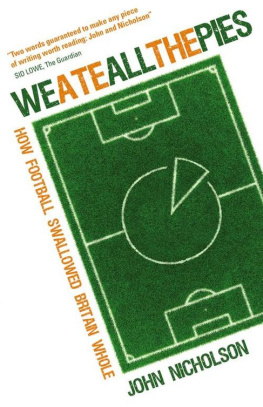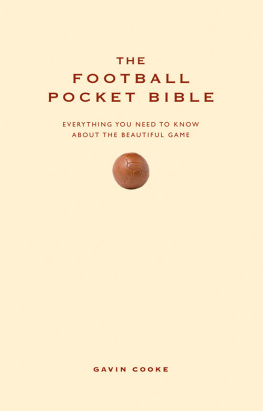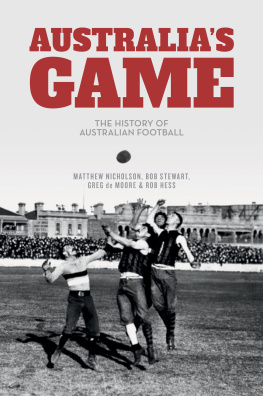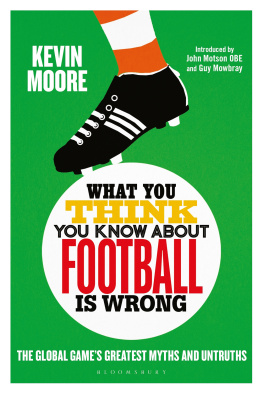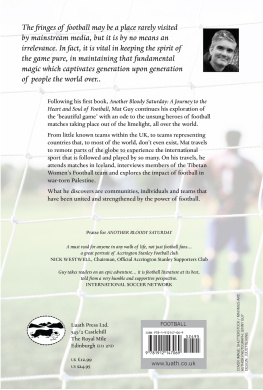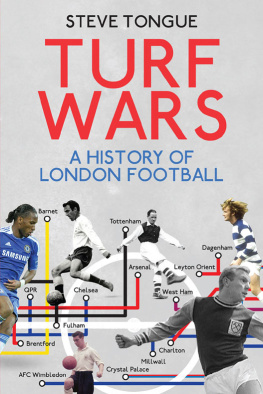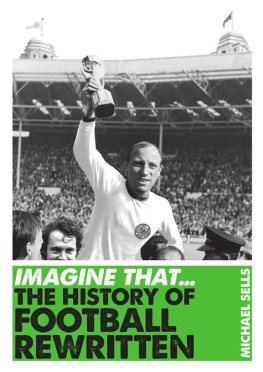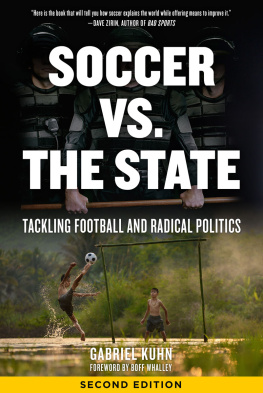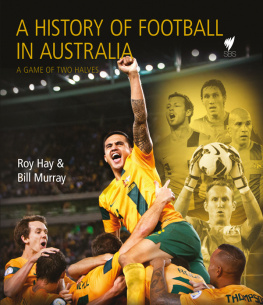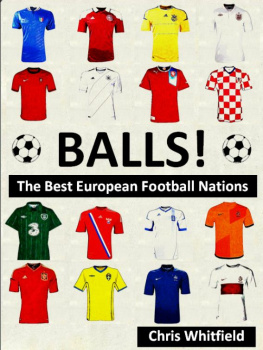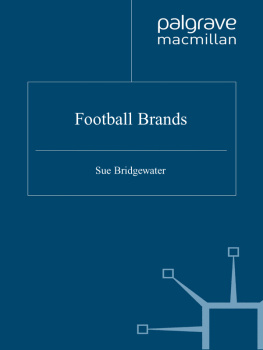T hanks to Winty, Nick, Pete and Tim at Football365 for all their help and support over the years.
Cheers to Robert for the pie memories and to Kev for all the Teesside recollections and for over 30 years of rock n roll.
Thanks also to Andy for info on Scottish drinking a matter close to all our hearts and to Alan for his encouragement throughout this project.
Finally, thanks to Humf for his help in getting this off the ground and to Dawn for telling me to bloody well get on with it and make us some money.
I T was 30 July 1966 when, as a five-year-old boy, I realised the power of football for the first time. England were in the process of winning the Jules Rimet Trophy live on our 12-inch black-and-white television but outside our house in Hull, our next-door neighbours, the Coates, were cutting their grass, and ignoring Bobby Moores triumph.
My mother peered out and tutted, Look at them, doing that, on a day like this. Theres something wrong with them.
Dad nodded sagely. Its unpatriotic if you ask me, cutting your grass while Englands playing in a World Cup Final, he said, peering over his glasses at the action out on their front lawn.
Youre right, Eric, she said, unusually agreeing with him. It wouldnt surprise me if they were German, on the quiet.
Aye, probably changed his accent or something, said Dad, his paranoia increasing, or he might be Scottish!!
Mam frowned and wagged her finger at me. Dont you go speaking to them, our John. We dont want you talking to people like that. Isnt that right, Eric?
Aye. You never know with people like that, could be up to all sorts, said Dad, ominously, as Nobby Stiles kicked Wolfgang Overath, maybe as revenge for the Luftwaffe bombing his chippy.
Previously, these neighbours had been blameless in my parents eyes, certainly not regarded as odd, possible enemies of the state, Germans or, worse still, Scottish, but because they were not in the least bit interested in watching England playing football, they were now some kind of outlaws.
Even at the time I thought this was a bit odd. You dont have to like football. Not wanting to watch England kick a ball around doesnt mean you want to assassinate the Queen, establish a fourth Reich or even wear a kilt.
But football is not a normal sport, it is a cultural phenomenon around which all manner of attitudes, beliefs, hopes and desires are wrapped and, even as a boy, as I witnessed it being used by my parents as a stick to beat the neighbours with, I realised it was something very special and it began to affect me from that day onwards.
Football. Football. Football. You love football. I love football. The world loves football. Why the hell are we all so obsessed with football?
When you stop to think about it, its astonishing how much it preoccupies so many millions of us virtually every day of our lives. Its not a recent, media-driven phenomenon, its always been like this. Huge crowds of people have watched the game since its inception over 140 years ago.
It cant just be twenty-two people with varying degrees of talent kicking a ball around a rectangle of grass that makes it so compelling. It must be something else; something that pulls us in and holds us captivated.
So what is this football dark matter? Thats what We Ate All the Pies is all about. I wanted to know how and why football has managed to consume my life so completely and why its done the same thing for millions of people for over a century.
Along with rock n roll, it was the enduring, profound influence in my formative years.
Its been a major part of, not just my life, but of me. It made me who I am.
Football isnt just the game on the pitch; while that is at the core of it, there is a huge cultural vortex that swirls around those ninety minutes. For me, and Im sure for many people, the various cultural activities that surround the game, like planets orbiting a sun, are every bit as enjoyable as the on-pitch action, often much more so.
Its easy to forget just how huge football is in the UK. Go anywhere in Britain and youll find a football team. Put a very big duffle coat on and go right up in the north of Scotland; there youll find Wick Academy who are the most northerly football club in the UK, located on a latitude line north of Moscow and stuck right on the Caithness peninsula. And this is no modern dalliance; it was formed in 1893 and currently plays in the Highland League, a collection of clubs based in wonderful, remote, small towns north of the Grampians.
Then fly over 890 miles south to the other end of the land to Mousehole FC (pronounced Mowzle), a tiny club south of Penzance in the deep south west who play at Trungle Parc and compete in the South West Peninsula League. Its at the bottom of the football league pyramid but they dont just have a first team but a reserve team as well!
Go anywhere in the UK and youll find a football ground of one size or another; from Tow Law on the bleakest, windswept moors of County Durham to bucolic Newport on the Isle of Wight. At times its almost invisible because we take a set of goals, a pitch and some sort of stand so for granted.
The amount of clubs that form the complete English football pyramid alone is enormous for a relatively small country. After the four top leagues there are another seven steps from the Blue Square Premier League right down to local leagues such as the Northern Alliance League or the West Sussex Football League.
There are a total of ninety-one different leagues and 1,600 different clubs and all of them are in theory capable of rising to the Premier League via promotion. Who knows, maybe Stobswood Welfare from the Northern Alliance second division could, in a mere twelve or thirteen years, winning their league each year, be playing Chelsea in the Premier League, if Chelsea and the Premier League still exist in twelve or thirteen years, which is by no means certain.
Add to that the leagues in Scotland, Wales and Northern Ireland and its surprising theres room for anything else in the UK except football pitches.
But its not just the actual playing of football that comprises the culture of the game; there are just so many football-related activities in this country that are important in moulding and shaping our lives. Whether its a pint and pie before a game, whether its slobbing out on the sofa watching six hours of games and punditry or whether its collecting memorabilia and buying shirts, its all a massive part of the football fans life.
Then theres going to the games. Millions do it every week at all levels of the game. Football is so popular in England that the Championship the second tier is the fourth best attended in Europe. Overall attendance figures are only a few million less than in the peak post-war years, when football was virtually the only affordable working-class entertainment and there was no health and safety legislation stopping you cramming 83,000 people into creaking old wooden stands designed to hold no more than 40,000. Having your internal organs crushed on an iron crash barrier was a rite of passage back then.
On top of the high, high attendance figures are the millions watching on TV too. Indeed, the highest viewed programme in the history of British television isnt, as you might assume, an episode of EastEnders or Coronation Street, not a Morecambe and Wise Christmas special or the relentlessly mawkish coverage of Dianas funeral. No, it is the 1966 World Cup Final. Some 32.3 million people watched that on just 15 million TV sets. Sixth on that list is the Chelsea vs Leeds 1970 FA Cup replay at 28.49 million. By God, we like watching football on TV in this country.
The game is so endemic in our lives that we probably dont even realise it most of the time. For example, if youre a serious football fan, the chances are that whatever the time of day it is when you read this, you have already thought quite a bit about football, especially if your club has got a game in the next day or two.

